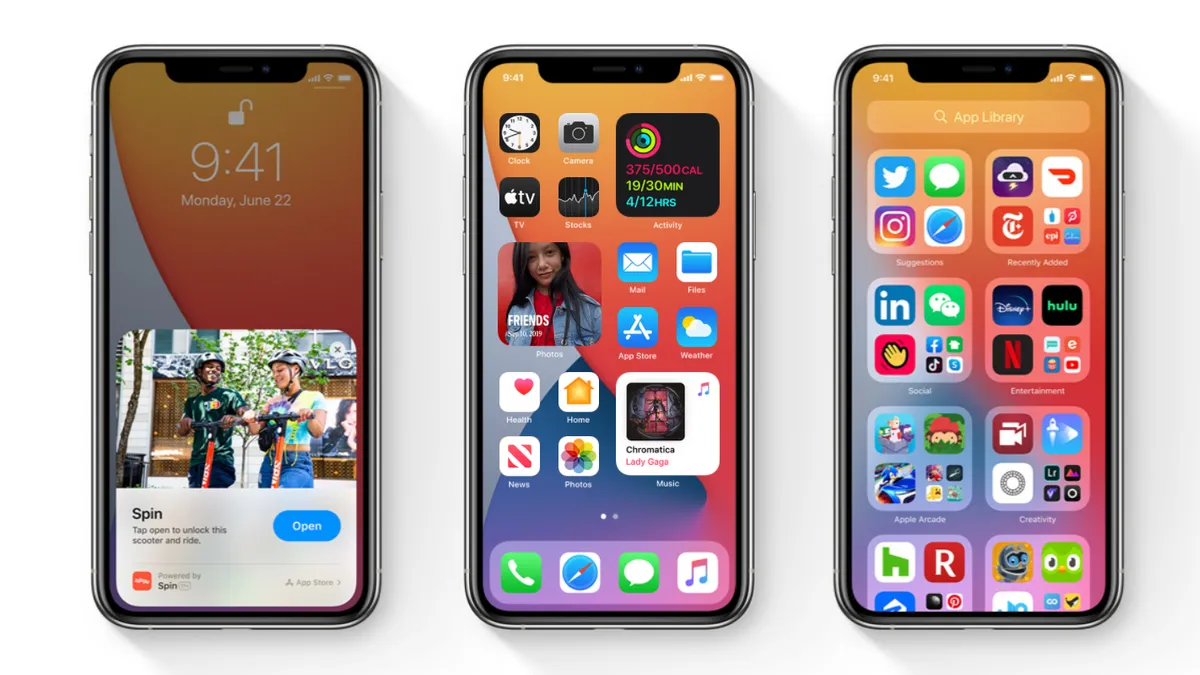Brief:
- Advertising companies and publishers in France filed a complaint with the country's competition authority against Apple, claiming that the iPhone maker's planned privacy changes are anticompetitive, The Wall Street Journal reported. Apple early next year will update its mobile operating software to force apps to obtain opt-in consent from people to share an identifier used for ad targeting and measuring campaign performance.
- The Interactive Advertising Bureau France, one of two trade groups that filed the complaint, argues that few users of Apple's products will provide consent. They claim that Apple will make it more difficult for advertising technology companies to track audiences and for content providers like publishers and game developers to sell personalized advertising, the Journal reported. The trade associations asked France's competition authority to block Apple from changing iOS 14 while it investigates a bigger complaint into the company's business practices.
- Separately, Apple is developing its own search engine that might replace Google on its devices as antitrust authorities scrutinize the ties between the tech giants. Apple's web crawler, called Applebot, is increasingly active in gathering information about websites to index, the Financial Times reported, citing search marketing experts.
Insight:
The complaint by advertisers and publishers in France against Apple is noteworthy because of how unique the argument against Apple's planned privacy changes are, with the Journal calling it one of the first times antitrust rules have been leveraged to try to challenge measures intended to enhance consumer privacy. The complaint is surprising, given that France as a member of the European Union has one of the most comprehensive consumer privacy laws in the world with the General Data Protection Regulation (GDPR) that took effect in May 2018 after years of debate. However, the complaint highlights the growing alarm over Apple's plans among companies throughout the digital advertising marketplace that fear a loss in revenue, and shows how antitrust laws may be invoked to regulate the company. As such, it could lay the groundwork for similar antitrust complaints in other countries.
While Apple already had allowed customers to block tracking by changing the settings in their devices like the iPhone, the company in June announced plans to make those steps easier at its annual WWDC event for developers. Apple, which for years has described privacy as a "fundamental human right," demonstrated how a planned updated to iOS 14, iPadOS 14 and tvOS 14 would show a pop-up notice to give device users a choice to stop device tracking after they downloaded or updated an app. Consumers who declined to give consent would block access to Apple's Identifier for Advertisers (IDFA), a randomly generated code that the company assigns to devices. While the IDFA doesn't reveal personally identifiable information, it helps marketers to track user activities and improve their ad targeting.
Apple had planned to introduce the changes in September, but delayed the move amid criticism from companies that expressed alarm about the potential harm to buyers and sellers of advertising. A survey by Tap Research indicated that 85% of consumers would opt out of tracking, making Apple's identifier effectively useless. Social media giant Facebook warned that Apple's privacy protections might cause a 50% drop in revenue for its Audience Network that lets developers use Facebook's data for in-app ad targeting. The Weather Co., which operates weather.com, estimated that the change would trigger a 40% drop in the price of media placements in iPhone apps that sell ad space, per an earlier Journal report.
Other critics have said that Apple's change will give it an unfair advantage in selling personalized advertising on the App Store, the online marketplace for apps, and Apple News, its news aggregation service. Apple makes about $3 billion to $4 billion a year from those ad sales, per an Arete Research estimate cited by the Journal. Users of Apple products can opt out of personalized ad tracking by changing the settings on their devices.
DMG Media, which publishes the Daily Mail and MailOnline, complained to the Justice Department in August that the ad-tracking pop-up would be anticompetitive, a person familiar with the matter told the Journal. The complaint may resonate with antitrust authorities that are said to be investigating Apple's management of the App Store. Companies including Spotify, "Fortnite" creator Epic Games and Tinder owner Match Group have complained that Apple collects excessive fees and unfairly hinders competition with its control of the App Store and created an advocacy group to push Apple and other app store gatekeepers to change their rules on how apps can operate.
Apple this year was hit with a record €1.1 billion ($1.23 billion) antirust fine from France's competition authority, which accused the company of masterminding a distribution cartel with wholesalers. Apple said it disagreed with the decision and planned to appeal it in court. Several months later, EU antitrust authorities opened an investigation into whether Apple violated competition laws with the App Store and contactless payment service Apple Pay. The latest complaint by advertisers and publishers in France may lead competition authorities to scrutinize the company's plans to update the privacy settings in its operating software.













